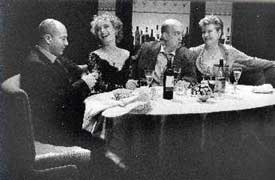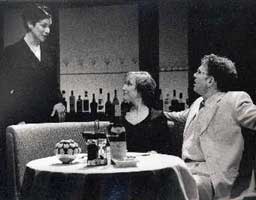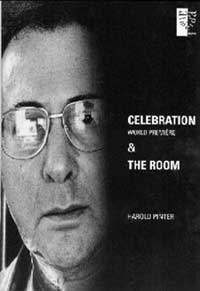
Keith Allen, Lindsay Duncan, Andy de la Tour and Susan Wooldridge
photo
Ivan Kyncl |
Pinter Double
Sheridan Morley
It is not often you get to see the first and the most recent plays
by a major dramatist in the same double bill, and rarer still when
these plays are separated by more than 40 years. But at the Almeida
we currently get just that: Harold Pinter's The Room (1957) followed
by his Celebration (2000) in an immensely assured production by
the playwright himself, one which will, I suspect, be in the West
End before he has time to write anything else. To start with the
new work: Pinter has occasionally and rightly complained that critics
seldom credit him with any sense of comedy, and as if to disprove
that misap-prehension Celebration is certainly his funniest and
also perhaps his most accessible script in many years. It is set
in an amazingly familiar West End restaurant, where he has even
managed to cast a lookalike for the tall, urbane real-life manager;
at two separate tables (and it is worth noting the subtext here:
while Pinter was writing The Room, he was playing in Rattigan's
Separate Tables, to which Celebration owes a minimal debt) sit a
cross-section of recognisable Pinter types. At the smaller table
are a couple (Stephen Pacey and Lia Williams) taunting each other
with past and present infidelities; at the larger, two Mafioso thugs
and their blowsy, aging trophy-wives are celebrating a wedding anniversary.'
But, as usual with Pinter, there is a good deal going on just under
the tablecloths; neither group is really in any mood for celebration,
and as the wine loosens their tongues some extremely unpleasant
truths start to crawl out from the past. Meanwhile, the unctuous
manager, his female assistant and a young waiter with extraordinary
false-memory fantasies start to assert themselves as something more
than restaurant staff, and at the end of the evening it is the young
waiter (Danny Dyer in what should be an award-winning performance),
left alone on stage to confront his own demons, who has not only
the last words but also the most immedi-ate claim to our ultimate
attention. Virtually all this wondrously versatile cast also appear
in The Room, where to complete this Pinter circle they are
joined by the actor who first discovered and directed the play back
in the Fifties, Henry Woolf. What is intriguing here is the way
that The Room not only signals and foreshadows everything that we
now mean by Pinteresque, but also the way that it has failed to
date. Unlike, for instance, Look Back in Anger, first staged a year
before The Room and now often looking very creaky indeed, the Pinter
is made timeless by its signature minimalism, by its sense of unspoken
menace and mystery, by its abso-lute refusal to play the game by
any of the then current theatrical rules. The reason that Pinter's
earliest critics (among them Noel Coward, who very quickly came
around to him) found The Room so hard to take was largely that it
made a then traditionally lazy audience do at least some of the
work to fathom the unfathomable. Now the sinister landlord, the
downtrodden housewife and the two thuggish visitors seem like old
friends rather than new threats; both these plays are about some
of the same things - sexual jealousy, name-less tenors, violent
men and women who have only their sex to define them. But where
The Room is frequently vicious, Celebration is something still more
dangerous; the only visible knives here may be the ones on the elegantly
laid tables, but people are also getting laid and knifed, only this
time with a smile. It is the smile of the killer monsters and mobsters,
but the shark still has shiny teeth, dear, and Pinter shows them
pearly white.
The Spectator 1 April 2000
Reproduced courtesy of the Spectator

Indira Varma, Susan Woolridge
and Steve Pacey
photo Ivan Kyncl
|
Space Invaders
Michael Billington
More than 40 years separate these plays: Pinter's latest and his
very first which together make up a richly entertaining double-bill.
Yet, for all their obvious contrasts, I was struck by a curious
similarity between the two works: both reveal Pinter's abiding fascination
with hermetic, insulated figures who suddenly find their space invaded
and their terri-tory threatened. In Celebration, the funniest, feistiest
piece Pinter has written in years, the safe haven in question is
a smart restaurant where a wedding anniversary is in full, raucous
swing. Two married couples, actually brothers and sisters, sit at
one banquette: a banker and his wife at another. What Pinter reveals,
with a good deal of satirical verve, is the coarse swagger and loutish
insensitivity of these walking wallets and their spouses. But Pinter's
plow is much more than an obvious attack on the nerdy nouveau riche.
Just as in Party Time we see a group of smart socialites rejoicing
in a 'club" which cuts them off from grim reality, so here the diners
use the restaurant as a retreat from the out-side world: a world
in which the two brothers operate as strategy consultants whose
job is "enforcing peace". And, as always in Pinter, there is no
such thing as a harmless sanctuary: here the threat to an evening
of crude conviviality comes from an intrusive waiter who offers
increasingly bizarre, name-dropping tales of a grandfather who seems
to have known everyone this century. Behind the play's wild comedy
lurks something strange and incalculable which is beautifully caught
in Pinter's fast-moving production. The performances too are spot-on
with Keith Allen and Andy de Ia Tour catching the matching vulgarity
of the two brothers, Lia Williams combining sexiness and asperity
as the banker's trophy wife and Danny Dyer as the far-from-dumb
waiter implying a world of eccentric otherness far beyond the comprehension
of these self-absorbed diners. If the archetypal Pinter situation
is one of space-invasion, then you see its origins in The Room,
first performed at Bristol University in 1957. Here the immured
heroine, Rose, finds the rooted privacy which she shares with her
silent husband successively threatened by her talkative landlord,
a pair of married flat-hunters and by a blind black man call Riley
who mysteriously bids her to come home. The milieu may be miles
away from that of Celebration but in both womb-like retreats are
opened up and anything "foreign" is seen as a potential menace.
Admittedly the symbolism is more heavy-handed than in later, greater
Pinter but what is extraordinary about his new production is the
intensity of feeling between Lindsay Duncan's panic-stricken Rose
and George Harris's monumentally imposing Riley.
The Guardian March 2000
reproduced with kind permission Michael Billington
|




